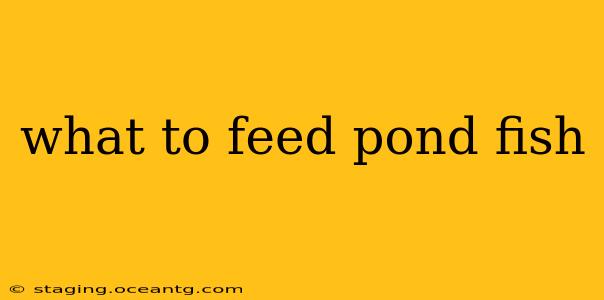Keeping a healthy pond teeming with vibrant fish is a rewarding experience. However, providing the right nutrition is crucial for their wellbeing and longevity. Choosing the wrong food can lead to stunted growth, disease, and even death. This comprehensive guide will explore the best foods for your pond fish, addressing common questions and concerns.
What is the best food for pond fish?
The "best" food depends largely on the species of fish inhabiting your pond. However, a high-quality, commercially produced pond fish food is generally the best starting point. These foods are formulated to meet the nutritional needs of common pond fish, providing a balanced diet of protein, carbohydrates, and essential vitamins and minerals. Look for foods specifically designed for koi, goldfish, or other species present in your pond, as their dietary requirements can vary.
Avoid feeding your pond fish table scraps. While tempting, human food often lacks the necessary nutrients and can contain harmful substances that can upset their digestive systems and contaminate the pond water.
What should I feed my koi fish?
Koi are known for their vibrant colors and impressive size, and their diet plays a significant role in maintaining their health and appearance. High-quality koi food, typically in pellet or flake form, should form the basis of their diet. These foods are usually formulated with higher protein content to support growth and color enhancement. Look for foods that are low in fillers and rich in essential nutrients. Consider supplementing their diet with occasional small amounts of high-quality vegetables, like blanched lettuce or peas (remove the outer shell first).
What do goldfish eat in a pond?
Goldfish, like koi, benefit from a balanced commercial diet. Choose foods specifically formulated for goldfish, as their dietary needs differ slightly from koi. Again, avoid overfeeding, as this can lead to water pollution and health problems. Like koi, occasional treats of blanched vegetables can be beneficial, but should be offered sparingly.
Can I feed my pond fish bread?
No, you should absolutely avoid feeding your pond fish bread. Bread lacks essential nutrients and can actually be harmful to fish. It swells in their stomachs, leading to digestive problems, and its decomposition contributes to poor water quality.
How much should I feed my pond fish?
Overfeeding is a common mistake among pond owners. It's better to feed your fish less than more. A good rule of thumb is to feed only what your fish can consume within a few minutes. Observe your fish closely; if food remains uneaten after this time, you're feeding too much. Adjust the feeding amount accordingly. Also consider adjusting feeding frequency depending on the season; generally, you'll need to feed less in colder months.
What are the signs of malnutrition in pond fish?
Malnourished pond fish may exhibit several signs: slow growth, dull coloration, lethargy, and susceptibility to disease. If you notice any of these symptoms, review your feeding regimen and consider consulting a veterinarian specializing in aquatic animals.
What type of food is bad for pond fish?
As mentioned earlier, bread, and other human foods like processed snacks, are extremely harmful. Foods high in fats and sugars can also lead to health problems. It’s crucial to stick to commercially available fish food formulated for your pond's inhabitants.
How often should I feed my pond fish?
The frequency of feeding depends on the water temperature and the type of fish. During warmer months (60°F and above), most pond fish benefit from daily feeding. In cooler months, reduce feeding to every other day or even less frequently, as their metabolism slows down.
By following these guidelines and selecting appropriate food, you can ensure your pond fish thrive, exhibiting vibrant colors and healthy growth, adding beauty and tranquility to your outdoor space. Remember to always observe your fish carefully to ensure their well-being and adjust feeding practices as needed.
